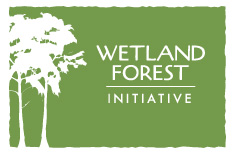Today is World Wetlands Day, and we’re proud to celebrate by announcing a new coalition – the Wetland Forest Initiative – dedicated to conserving, restoring, and improving Southern wetland forests. Check out the press release below for more on this exciting new initiative:
On World Wetlands Day, a diverse group of stakeholders have joined together to announce a major multi-state effort to conserve one of America’s most precious natural resources, wetland forests of the South. The Wetland Forest Initiative is a new, collaborative effort dedicated to conserving, restoring, and improving the condition of Southern wetland forests.
The initiative will work with landowners, communities, conservation organizations, and government agencies to create a future where there are abundant and healthy wetland forests for the benefit of local communities and native wildlife. A majority of wetland forests have been lost due to conversion to agriculture and real estate development in the last 300 years.
“Today we are excited to join with communities, landowners, government agencies, and conservation partners to shine a spotlight on the role that our forested wetlands play in protecting our coastal communities from the worst impacts of climate change and as a treasure to our region’s natural heritage,” said Danna Smith, Executive Director at Dogwood Alliance. “We all share the common belief that working together we can make these forests the next great conservation priority in the United States.”
Historically, wetland forests blanketed much of the Southern US. However, as the region continued to grow, wetlands and wetland forests were converted for other uses. As a result, a majority of the original wetland forests in the region have been lost (Ref 1.). The wetland forests that remain are sometimes degraded so much that there is a great need for restoration in these areas.
Southern wetland forests are home to many threatened and endangered species which rely on these unique habitats to survive and reproduce. Many of the region’s intact wetland forests occur in the coastal plain. A world biodiversity hotspot, the Southeastern and Gulf Coastal Plains have nearly 600 animal and over 1800 plant species found nowhere else on earth (Ref. 2).

Wetland forests provide critical “ecosystem services” — benefits to human communities that go beyond monetary value. For example, wetland forests provide twice the value in endangered species and wildlife habitat, pollution control, flood control, and water treatment than upland forest habitat (e.g., mixed pine and hardwoods) (Ref. 3). They are also significantly better at storing carbon, which helps to offset manmade carbon emissions and mitigate climate change.
“In the Gulf of Mexico region, not only do we love our wetland forests for hunting, fishing and their natural beauty, wetland forests are a matter of life and death when it comes to protecting our communities from flooding and hurricanes,” said Raleigh Hoke, Campaign Director at Gulf Restoration Network.
The Wetland Forest Initiative will elevate wetland forests as a national conservation and restoration priority. Additionally, the collaboration plans to work with landowners, foresters, and others to help implement sound management practices on “working lands” — lands used for timber production, while also working with nearby communities to increase resilience, diversify economic opportunities and enhance quality of life. The Wetland Forest Initiative is currently composed of a steering committee and several working groups, which include members from these organizations (alphabetical): American Forest Foundation, National Audubon Society, Black Family Land Trust, Carolina Wetlands Association, Clemson University, Defenders of Wildlife, Dogwood Alliance, Forest Stewards Guild, Gulf Restoration Network, Hip-Hop Caucus, Louisiana Department of Wildlife & Fisheries, National Wildlife Federation, National Woodland Owners’ Association, Natural Resources Defense Council, One Hundred Miles, Open Space Institute, Poarch Band of Creek Indians, Public Lab, Southern Group of State Foresters, University of Georgia, Wildlands Network, Wild South, and Wild Virginia.
For more information, visit: www.wetlandforests.org
